英语人教版六年级上册Unit Three A Let's talk
新版六年级英语上册unit3A_Let's talk

Make a new dialogue: What are you going to do? I’m going to…. We are going to…. I have to….
with Mike.
Talk about your and your friends watch TV weekend plan. I am going to …. What is …going to do ? He/She is going to ….
Homework
1.Read and recite Let’s talk. 2.Make a weekend plan.
Let’s chant
What is Wu Yifan going to do tomorrow?
He is going to visit his grandparents.
What is … going to do tomorrow?
He is going to take a trip.
What is … going to do tomorrow?
Read and answer the questions 1.What is Sarah going to do tomorrow? Sarah is going to have an art lesson. 2.What is Mike going to do tomorrow? Mike is going to see a film. 3.What are they going to do in their art lesson? They are going to draw some pictures in Renmin Park.
Picture,picture, I will draw a picture. Film, film, I’m going to see a film. Trip, trip , I’m going to take a trip. Lesson, lesson, I’m going to have a lesson. Homework,homework, I have to do my homework. What are you going to do ? What are you going to do ?
2020人教版PEP英语六年级上册课文Unit-Three
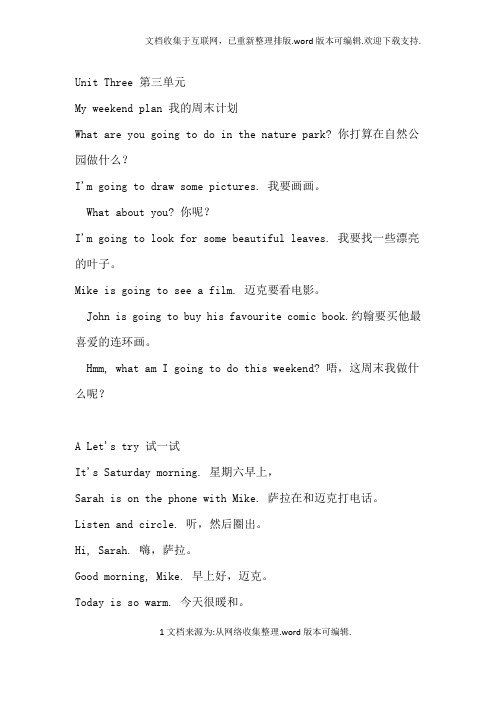
Unit Three 第三单元My weekend plan 我的周末计划What are you going to do in the nature park? 你打算在自然公园做什么?I'm going to draw some pictures. 我要画画。
What about you? 你呢?I'm going to look for some beautiful leaves. 我要找一些漂亮的叶子。
Mike is going to see a film. 迈克要看电影。
John is going to buy his favourite comic book.约翰要买他最喜爱的连环画。
Hmm, what am I going to do this weekend? 唔,这周末我做什么呢?A Let's try 试一试It's Saturday morning. 星期六早上,Sarah is on the phone with Mike. 萨拉在和迈克打电话。
Listen and circle. 听,然后圈出。
Hi, Sarah. 嗨,萨拉。
Good morning, Mike. 早上好,迈克。
Today is so warm. 今天很暖和。
1文档来源为:从网络收集整理.word版本可编辑.Let's go swimming. 我们去游泳吧。
Sorry, I can't. 对不起,我不能去。
I have to do my homework now. 我现在必须做作业。
B: OK. 好吧。
What about this afternoon? 那今天下午呢?No, I can't. 也不行。
I'm going fishing. 我要去钓鱼。
1. Can Mike go swimming today? 迈克今天能去游泳吗?2. Why or why not? 为什么?Let's talk 谈话Mike: What are you going to do tomorrow? 明天你打算做什么?Sarah: I'm going to have an art lesson. 我要上美术课。
英语人教版六年级上册unit3 partAlet's talk

Homework
Fenghuangshan park Zhaofeng mountain bookstore post office cinema supermarket library ……
• 1.朗读本课时的对话。 • 2.抄写四会句子3遍。 • 3.将本单元的歌曲唱给家人或朋友听。 • 4.对看已的周末做出详细安排,并以
表格形式写出。
Time
Saturday Sunday
morning
afternoon
evening
clean my rdooommy homework this morningthis morning
the zoo tomorrow
Group work
Welcome to CFehnagnngasnha
假如你是导游员:结合实际 安排周末旅游计划并进行对 话练习,下面的词供大家选择 (四人小组进行):
Report1: We are going to do some shopping on Saturday morning, we have lunch at the supermarket, Then, we are going to the bookstore on Saturday afternoon, and we are going to the cinema on Saturday evening.
Pair-work
PEP新教材人教新版小学英语六年级上册Unit 3 A Let's talkP24

Let’s try
It’s Saturday, so early in the morning
It’s 9:30 on Saturday morning, Mike is calling Sarah again.
tomorrow plan
What are Mike and Sarah going to do tomorrow? have an art lesson. Sarah is going to____________________ see a film. Mike is going to___________________
Group work
Act the dialogue in role.
Retell the dialougue
Mike is calling Sarah. They are talking about tomorrow plan. Sarah is going to have an art lesson. She is going to draw some pictures in Renmin Park. Mike is going to see a film. They will have a good time tomorrow.
use a computer
make the bed
play computer games read books
do the dishes watch TV draw pictures clean the bedroom
Let's chant
I am going to buy a book. I am going to take a look. I am going to bake a a cake. I am going to walk near a lake. We are going to take a trip. We are going to take a sip. I am going to outside to play. I am going to have a good day.
英语人教版六年级上册Pep7 Unit3 A let's talk
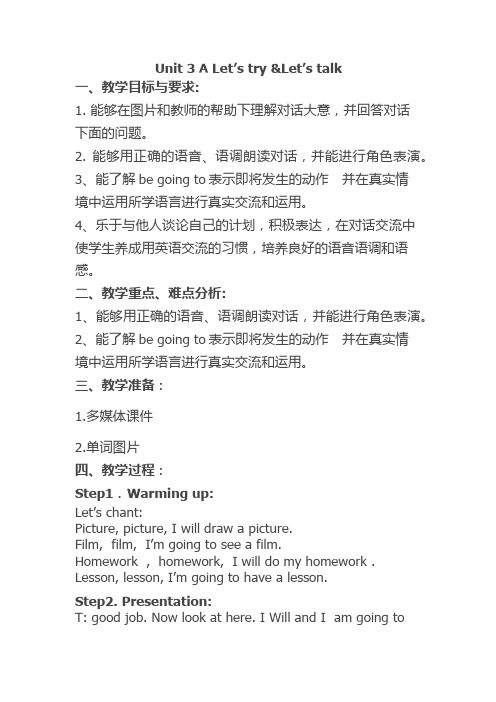
Unit 3 A Let’s try &Let’s talk一、教学目标与要求:1. 能够在图片和教师的帮助下理解对话大意,并回答对话下面的问题。
2. 能够用正确的语音、语调朗读对话,并能进行角色表演。
3、能了解be going to表示即将发生的动作并在真实情境中运用所学语言进行真实交流和运用。
4、乐于与他人谈论自己的计划,积极表达,在对话交流中使学生养成用英语交流的习惯,培养良好的语音语调和语感。
二、教学重点、难点分析:1、能够用正确的语音、语调朗读对话,并能进行角色表演。
2、能了解be going to表示即将发生的动作并在真实情境中运用所学语言进行真实交流和运用。
三、教学准备:1.多媒体课件2.单词图片四、教学过程:Step1.Warming up:Let’s chant:Picture, picture, I will draw a picture.Film, film, I’m going to see a film.Homework , homework, I will do my homework . Lesson, lesson, I’m going to have a lesson.Step2. Presentation:T: good job. Now look at here. I Will and I am going toThey are the same. I Will=I am going to. Clear?S:yes.T: when do we use “I’ll”. Chinese is ok.S:…T:great. Now, look. What is it.S: it’s a calendar.T:great. Saturday and Sunday, we call them…S:weekend.T:cool. So what do you often do on the weekend.S: I often…T:great. On the weekend, I often watch a film. And I often watch TV too. What is on TV?S:…T:yes. What do they often do on weekends?S:they often…T:here is the calendar again. They are…S:weekends.T: and they are this weekend.T: what will they do this weekend? What are they going to do this weekend? Let’s go and have a look. Who is he? S:he is a reporter.T: Who is he?S: he is Fimon.T:great. Now let’s be the reporter. Let’s ask Fimon.S: what are you going to do?T:good. Listen? What do you hear?S: I am going to see a film.T: who can be the reporter? Who can be Cindy?S:…T:good job. Now let’s listen.What is Mike going to do tomorrow?S:He is going to see a film.T:cool. What is Sarah going to do tomorrow? Let’s watch. S: …T: What is Sarah going to do tomorrow?S: she’s going to have an art class.T: great. Sarah says…S:I am going to having an art class.T: what is she going to do in her class?S: draw some pictures in Renmin Park.T: sounds great. What will Mike do then?S:do homework.T:yes. He has to do homework now.Step3: practice:1.Role play2. Fill in the blank3.Let’s chant4.Let’s talkStep4: homework:1.1.Listen to the dialogue and repeat it 3 times.2.完成相关练习3.2.Find the diffience between dilogue A and dilogueB.(找一找A、B两个对话之间的不同之处)五.教育反思:。
小学英语人教PEP新版六年级上册U3 A Let's talk课件

Thank you.
today
tomorrow
What is Sarah going to do tomorrow ?
She is going to have an art lesson lesson. (课程)
What is Mike going to do tomorrow ? He is going to see a film.
精品课件
小学英语人教PEP新版 六年级上册
市实小 清风制作
Unit3 My weekend plan
Part A Let’s talk
Questions :
1) Can Mike go swimming today?
No ,he can’t .
2) Why or why not ?
He has homework to do .
Mike: Sounds great! I’m going to see a film tomorrow. Sounds great Sarah: Have a good time. Mike : You too. I I have have to to do do my my homework homework now. now. Bye.
Mike: Sounds great! I’m going to see a film tomorrow. Sarah: Have a good time. Mike : You too. I have to do my homework now. Bye.
Sarah : Ok. Bye.
go ice-skating
Sarah : Ok. Bye.
Mike :What are you going to do tomorrow ? Sarah: I’m going to have e you going to do in your lesson ?
人教版六年级英语上册第三单元unit three part B let's talk 教学课件【先学后教】
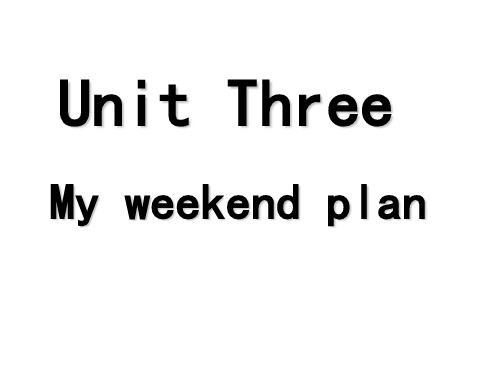
要求:
请小组讨论,短文正确读 音,5分钟后比哪个小组能最准 确读出短文。
第三次“先学后教” 比谁能最快会背 短文中的重点句型
要求: 1.小组长进行提问 2.老师抽测(5分钟)
当堂训练
汉译英: 1.你们打算去哪? 2.我们打算去电影院。 3.你们什么时候去?
Unit Three
My weekend plan
学习目标
1.能根据所学句型对地点进行询问, 并会回答. 2.能够理解let's talk的大意,会 读,并能小组内进行情景对话.
第一次“先学后教” 比正确翻译短文意思
自学指导 要求:
默看P26页,结合单词表,5
分钟后比谁能正确翻译出短文
意思.
பைடு நூலகம் 第二次“先学后教”:比哪个小组能 最准确读出短文
人教版小学六年级英语上册第三单元B Let’s talk教学设计

人教版小学六年级英语上册第三单元教学设计Unit 3 B Let’s t alk课题说明:本课的教学内容要求学生掌握where, what 及 when引导的特殊疑问句并能做出相应的回答以及各种信息的替换和交流;且能运用疑问句进行真实的交际。
课时说明:本案例是第三单元的第五课时,学生在前面已学过where, what 及 when 特殊疑问句,因此,这节课的教学任务是如何在学习新知识的基础上,利用和拓展所学的旧知识,真正达到学以致用。
学生情况说明:学生通过五年级上册Unit 3 及本册书Unit 1 和Unit 2的学习,对where, what 及 when三个疑问词引导的特殊疑问句的问与答有较好的掌握,这为本单元的教学提供了有利的基础。
本单元的教学内容是询问未来几天或周末活动安排,要求学生能对句型中的具体信息进行替换,并能联系实际,进行真实语言交际。
在教学时,通过创设情景,运用多种教学手段,开展灵活多样的教学活动,适时引导学生合作学习,探究学习等学习方法,将新旧知识有机结合,并对本单元知识加以强化,从而让学生更好地掌握和拓展“未来计划安排”这一知识点,实现有效的课堂延伸。
课题名称:What are you going to do ?教学目标:1.知识与技能目标:a. 能听,说,读where, what 及 when引导的特殊疑问句并能做出相应的回答。
b. 能综合运用四会句子:Where are you going this afternoon ?I’m going to the bookstore .What are you going to buy ?I’m going to buy a comic book .2.情感态度:培养学生合理安排自己的学习与生活的能力,培养学生从小树立远大理想并为之努力的思想意识。
3.文化目标:了解有关计划制定方面的知识。
教学重、难点:1.重点:三个特殊疑问句的问与答以及各种信息的替换和交流。
最新PEP人教版英语六年级上册Unit3 A Let s talk优质课课件

4.你下周准备做什么?我准备去旅行。
_____ ____ you ____ ___ ____ next week?
I ____ _____ _____ take a trip.
5. 你准备今天早上看电视吗?是的。
_____ you _______ _____ watch TV this morning?
My mother is going to read a book this afternoon.
Mike is going to play football with his friends.
A:What are you going to do tomorrow? B: I am going to draw pictures in Renmin Park. What about you? A: I am going to see a film.
t evening
= tonight
4.tomorrow 明天 5.next week 下周 注意:时间一般放在句子最后面。
1. read a book I am going to read a book tomorrow.
2.trip 旅游 take a trip 去旅行
Yes, ___ ____.
二、用be(am,is,are)填空。
1. I ____ going to do homework this evening. 2. He _____ going to read books tonight. 3. They _____ going to play football this afternoon. 4. _____ you going to take a trip next week? 5. Mike _____ going to see a film tomorrow. 6. Mike and John ____ going to swim this morning.
pep人教版六年级上册第三单元PartALetstalk

Work in pairs.
In the teachers' office
Ms Long: Ms Qian, what are you going to do this evening?
Ms Qian: I'm going to the supermarket.
Ms Long:What are you going to buy?
Ms Qian: I'm going to buy some fruits . They are
heathy and delicious.
Ms Long: Sounds great! I'm going to go for a walk
Free talk
A: What are you going to do this weekend? B: I’m going to …
Say the sentence one by one.
A:... ? B: I am going to ......
Today's task:
Talk about your weekend plan in your group.
• Saturday,Saturday, this Saturday, • What are you going to do this Saturday? • Sunday,Sunday, this Sunday, • What are you going to do this Sunday? • Weekend,weekend,this weekend, • What are you going to do this weekend?
人教版六年级英语上册第三单元unit three part A let's talk(1教学课件【先学后教】

C.aren’t
单项选择:
1. What
John going to do tomorrow? A. am
B. is C.are
2. I’m going to
Tomorrow at six. A.meet
B.meeting C. meets
3. Robin and I
gong to A.am not B.isn’t
第一次“先学后教”比正确翻译短文汉 Nhomakorabea意思自学指导
默看P24页,结合单词表,5分 钟后比谁能正确翻译出短文意 思。。
What are you going to do tomorrow?
明天你打算做什么?
I’m going to have an art lesson. 我打算上一节美术课.
What are you going to do in your class?
祝你玩得愉快!
You too. I have to do my homework now.Bye.
同样祝福你!现在我得去做家庭作 业了.再见.
OK.Bye.
好吧,再见!
自学指导
自学指导
What are you going to do tomorrow?
I’m going to have an art lesson。
你们打算在课上做什么? We’re going to draw some pictures in Renmin Park.
我们打算去人民公园画画.
Sounds great ! I’m going to see a film tomorrow. 听起来真好,明天我打算看电影. Have a good time!
人教版六年级上册英语Unit3 A Let's talk

Let’s try tick or cross: ( √ ) I’m going to Beijing on the National Holiday. (× I’m going by train. ) (× I’m going with my aunt and ) uncle. ( √ ) I’m going to have a new computer.
(5分钟后期待师徒们的合作)
the theme park
this afternoon
The Great Wall
Next week
A: What are you going to do ……?
B:I’m going to …….
A: Is it far?
zoo
tomorrow B: Yes/No, so I’m going…..
Task 2
看对话回答下面的问题:
What is John going to do on the weekend?
Task 3
请师徒两人一起朗读对话并 找出替换的部分。
两分钟后期待小徒弟们的踊跃发言!
Task 4:请师徒两人一 起交流对话的中文。
(3分钟后期待徒弟们的发言)
Task 5:请师徒两人一 起根据替换部分,合作 编一个新对话(参照对 话旁提供的图片)。
Studying aims(学习目标)
1、能听、说、读、写句子能给: What are you going to do on the weekend? I’m going to … 2、能够完成Let’s try,同时能在 Group work部分合理安排周末旅游 项目。
Task 1
请同学们认真听完成课本中的 Let’s try,两分钟后期待你们 的正确答案,看谁能复述听力 中的句子,come on!
2020新pep人教版六年级英语上册Unit-3-Part-A-let's-talk

Answer the question. 1.What is Sarah going to do tomorrow?
She is going to have an art lesson.
2.What is Mike going to do tomorrow? He is going to see a film.
Unit 3 My weekend plan
Part A Let's talk (P24)
visit my
take a trip
grandparents tomorrow
tonight next week
go to the see a film supermarket
p
What are you going to do today?
I'm going to htaavekeana atrrtiplesso.n
上美术课
WHale Waihona Puke at are you going to do in your lesson? 在你的课上
I'm going to draw some pictures in Renmin Park. 我打算在画人画民公园画画。
Park.
Mike: Sounds great! I’m going to see a film tomorrow.
Sarah: Have a good time!
Mike: You too. I have to do my homework now. Bye.
Sarah: OK. Bye.
Mike: What are you going to do tomorrow?
Sarah: I’m going to have an art lesson. 美术课
pep六年级英语上册unit 3 a let 39;s talk教案

有效导入
一、导入目标:
活跃气氛,激发学生的学习兴趣。引出新内容
二、导入方式:情景式、谈话式
三、导入内容:
A.复习Be动词的用法。
PEP六年级英语Unit3 A Let’s talk教学设计方案
课 题
Unit3 What Are You Going to Do?
talk
课型
常规课
教学目标
实现
目标
1.能够掌握四会句型:“What are you going to do on the weekend? I’m going to visit my grandparents this weekend.”并能在情景中运用。
三、精讲内容:
1.看图问答,操练句子.
2.听录音,回答问题.
3.朗读并作替换练习.
4.书写四会句子.
5.游戏:听音传盒问答.
四、精讲策略:
在新知识的巩固阶段,立足于教学重点,创设一些游戏来巩固新知,活跃了课堂气氛,又起到检查补漏的作用.
堂上精练
一、精练目标:巩固、训练单词和短语。
二、精练方式:Pair work.
2.培养学生综合运用语言的能力。
重点
运用be going to句型描述自己的活动计划与他人进行交流。
难点
四会掌握句型:What are you going to do on the weekend? I’m going to visit my grandparents this weekend.
学情分析:
人教版英语六年级上册第三单元let's talk
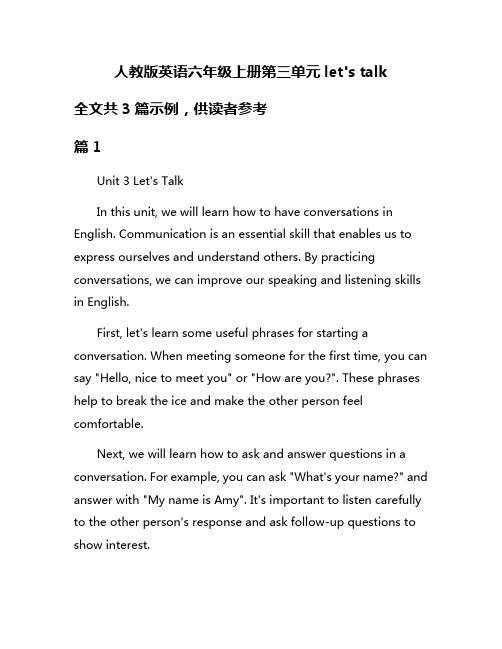
人教版英语六年级上册第三单元let's talk全文共3篇示例,供读者参考篇1Unit 3 Let's TalkIn this unit, we will learn how to have conversations in English. Communication is an essential skill that enables us to express ourselves and understand others. By practicing conversations, we can improve our speaking and listening skills in English.First, let's learn some useful phrases for starting a conversation. When meeting someone for the first time, you can say "Hello, nice to meet you" or "How are you?". These phrases help to break the ice and make the other person feel comfortable.Next, we will learn how to ask and answer questions in a conversation. For example, you can ask "What's your name?" and answer with "My name is Amy". It's important to listen carefully to the other person's response and ask follow-up questions to show interest.In conversations, it's also important to use polite language and manners. Saying "please" and "thank you" shows respect and appreciation. Remember to speak clearly and politely when communicating with others.To practice conversations, you can role-play with a partner or practice speaking with a native English speaker. By engaging in conversations, you will become more confident and fluent in English.In conclusion, learning how to have conversations in English is an important skill that will benefit you in many areas of life. By practicing speaking and listening, you can improve your communication skills and connect with others from different cultures and backgrounds. Let's continue to practice and improve our English conversation skills together!篇2Let's TalkUnit 3 of the sixth grade English textbook from the People's Education Press focuses on conversations and dialogues in various everyday scenarios. In this unit, students will learn how to engage in conversations about their likes and dislikes,preferences, and daily routines. Let's take a closer look at some of the key topics covered in this unit.1. Talking about likes and dislikesOne of the first topics covered in Unit 3 is expressing likes and dislikes. Students will learn how to use expressions such as "I like..." and "I don't like..." to talk about their preferences. They will also learn how to ask others about their likes and dislikes using questions like "Do you like...?" and "What do you like?"2. Talking about preferencesIn addition to likes and dislikes, students will also learn how to talk about their preferences. They will learn how to use expressions like "I prefer..." and "I would rather..." to express their choices. They will also learn how to ask others about their preferences using questions like "Which do you prefer...?" and "Would you rather...?"3. Talking about daily routinesAnother important topic covered in Unit 3 is daily routines. Students will learn how to talk about the activities they do on a daily basis, using expressions like "I get up at..." and "I go to bed at..." They will also learn how to ask others about their dailyroutines using questions like "What time do you...?" and "When do you...?"Overall, Unit 3 of the sixth grade English textbook from the People's Education Press provides a solid foundation for students to engage in conversations about their likes and dislikes, preferences, and daily routines. By mastering the key topics covered in this unit, students will be well-equipped to communicate effectively in a variety of everyday situations. Let's talk!篇3Let's Talk in Unit Three of Grade Six English Language TextbookUnit Three of Grade Six English Language Textbook focuses on communication skills with the topic "Let's Talk". This unit aims to help students improve their English speaking and listening abilities through various interactive activities and conversations. By practicing different dialogues and role plays, students will be able to enhance their confidence in using English in real-life situations.The unit starts with basic greetings and introductions, teaching students how to say "Hello", "How are you?" and "Myname is…". This sets the foundation for the rest of the unit, as students gradually move on to more complex conversational topics such as asking for directions, making plans, and discussing hobbies and interests.One key aspect of this unit is the emphasis on pronunciation and intonation. Students are encouraged to pay attention to how words are pronounced and how sentences are stressed in order to sound more natural when speaking English. By mimicking the teacher and practicing dialogues with their classmates, students can improve their speaking skills and become more fluent in English.In addition to dialogues, students also engage in role plays and group discussions to practice using English in a more interactive and engaging way. Through these activities, students are able to apply what they have learned in real-life situations, which helps them develop their communication skills and build confidence in using English.Overall, Unit Three of Grade Six English Language Textbook provides students with a solid foundation in spoken English and equips them with the necessary skills to communicate effectively in various situations. By practicing dialogues, role plays, and group discussions, students will be able to improve their Englishspeaking and listening abilities and become more confident English speakers.。
人教版六年级上册英语《Unit 3 Part B Let's try-Let's talk (2)》
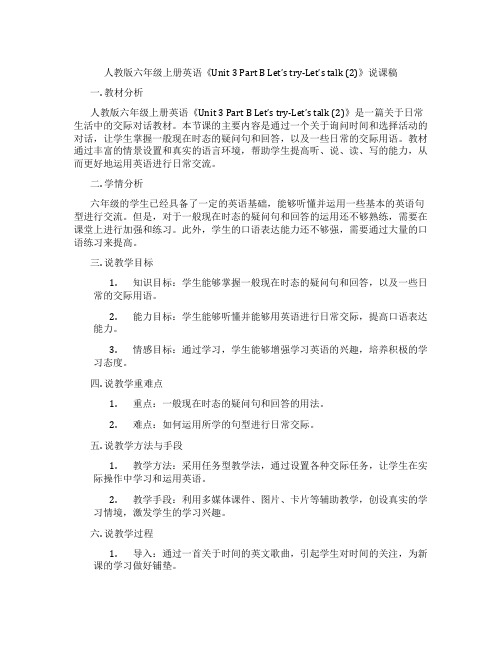
人教版六年级上册英语《Unit 3 Part B Let’s try-Let’s talk (2)》说课稿一. 教材分析人教版六年级上册英语《Unit 3 Part B Let’s try-Let’s talk (2)》是一篇关于日常生活中的交际对话教材。
本节课的主要内容是通过一个关于询问时间和选择活动的对话,让学生掌握一般现在时态的疑问句和回答,以及一些日常的交际用语。
教材通过丰富的情景设置和真实的语言环境,帮助学生提高听、说、读、写的能力,从而更好地运用英语进行日常交流。
二. 学情分析六年级的学生已经具备了一定的英语基础,能够听懂并运用一些基本的英语句型进行交流。
但是,对于一般现在时态的疑问句和回答的运用还不够熟练,需要在课堂上进行加强和练习。
此外,学生的口语表达能力还不够强,需要通过大量的口语练习来提高。
三. 说教学目标1.知识目标:学生能够掌握一般现在时态的疑问句和回答,以及一些日常的交际用语。
2.能力目标:学生能够听懂并能够用英语进行日常交际,提高口语表达能力。
3.情感目标:通过学习,学生能够增强学习英语的兴趣,培养积极的学习态度。
四. 说教学重难点1.重点:一般现在时态的疑问句和回答的用法。
2.难点:如何运用所学的句型进行日常交际。
五. 说教学方法与手段1.教学方法:采用任务型教学法,通过设置各种交际任务,让学生在实际操作中学习和运用英语。
2.教学手段:利用多媒体课件、图片、卡片等辅助教学,创设真实的学习情境,激发学生的学习兴趣。
六. 说教学过程1.导入:通过一首关于时间的英文歌曲,引起学生对时间的关注,为新课的学习做好铺垫。
2.展示:教师展示一篇关于询问时间和选择活动的对话,引导学生理解对话内容。
3.实践:学生分组进行角色扮演,模拟对话中的情景,进行实际操作。
4.巩固:通过各种游戏和练习活动,让学生充分运用所学知识,巩固所学内容。
5.拓展:教师引导学生进行小组讨论,用英语谈论自己的日常活动,提高学生的口语表达能力。
- 1、下载文档前请自行甄别文档内容的完整性,平台不提供额外的编辑、内容补充、找答案等附加服务。
- 2、"仅部分预览"的文档,不可在线预览部分如存在完整性等问题,可反馈申请退款(可完整预览的文档不适用该条件!)。
- 3、如文档侵犯您的权益,请联系客服反馈,我们会尽快为您处理(人工客服工作时间:9:00-18:30)。
(1)教学单词:trip词组take a trip
教师背上背包,对学生说:I’m going to take a trip with my family on Saturday.I’m going to see the mountains and flowers.板书:take a trip拼读记忆trip
(2)教学单词: film和see a film
教师出示一张电影票说:Tomorrow I’m going to see a film .板书:see a film,拼读记忆film,然后教师将电影票传给一位学生说see a film ,这位同学将电影票继续传给下一位学生,边传也要边说:see a film
4教学句子:What ate you going to do today ? I’m going to…
T:I’m going to visit my grandparents.What are you going to do ?
S:I’m going to sing English songs .What are you going to do ?...
3会唱歌曲《What are you going to do ?》
教学重难点:
重点:学习单词或词组visit, film, see a film, trip, take a trip,supermarket, evening, tonight, tomorrow,, next week,学习句子:What are you going to do today ? I’m going to…
2教学A Make a plan
学生利用书上的表格,独立指定周末计划,然后两人一组进行对话。
五家庭作业
1听录音,跟读对话
(2)教学单词:tomorrow和词组:next week
T:Today is Monday. Tomorrow is Tuesday.板书:tomorrow,让学生说说词义,全班拼读tomorrow.
教师板书:week,让学生湿度单词,告诉学生week是周的意思,补充板书成:next week,让学生试读词组,并说说意思。
Unit 3 A Let’s talk
教学目标:
1能够听说读写本课时主要单词或词组:visit, film, see a film, trip, take a trip,supermarket, evening, tonight, tomorrow,, next week.
2能够听说认读句子:What are you going to do today ? I’m going to…并能在实际情景中正确使用
三新课呈现
1教学单词:visit, film,词组visit my grandparents, see a film
(1)教学单词:visit和词组visit my grandparents
T:Today I’m going to have three English classes. After school I’m going to do some shopping . Tonight I’m going to visit my grandisit my grandparents,带读并拼读记忆单词。
教师出示超市的购物袋说:Let’s go to the supermarket.板书:go to the supermarket,然后边传购物袋边说词组:go to the supermarket
3教学单词:evening, tonight, tomorrow和词组next week
(1)教学单词evening, tonight
难点:识记单词supermarket
教学准备:
单词词卡;挂图;VCD;录音机;磁带
教学过程:
一热身
1师生问好
2 Sing the song :How do you get there ?
二复习
1活动:我演你说
教师事先在纸条上写下一些动作词或词组,如:dance,sing,swim, cook, watch TV,read a book, wash my clothes, clean the vegetables, draw pictures, do some kung fu.每组派上一名表演能力比较强的学生,抽取纸条,并将纸条内容用肢体语言表现出来给同组的学生猜,规定时间内哪组猜中数量多就获胜。
教师先拿出一个红色的圆纸片代表太阳,先由低到高,再由高到低缓慢地移动太阳,边移动边说:morning, noon, afternoon .然后师拿出一个月牙形的白纸片代表月亮,边移动边说evening,night .板书:evening, night .告诉学生:evening往往指下班后进入天黑及以后的一段时间,即可以举行大型公众party或活动的时段。而night往往是深夜以后的个人或家庭活动时段。提醒学生night不能用this night,而是tonight .
(2)教学单词:supermarket和词组go to the supermarket
教师出示超市的图片问:What’s this ?学生回答后教师说:Yes, it is a supermarket .We can buy many things in it .板书:supermarket,告诉学生这是一个多音节的单词,引导学生分音节记忆单词
板书:What are you going to do today ? I’m going to…
5教学A Let’s learn
(1)教师播放Let’s learn的课文视频,学生整体感知课文内容
(2)教师再次播放课文视频,每句后暂停,学生跟读
四巩固与拓展
1教学Let’s sing:What are you going to do ?
